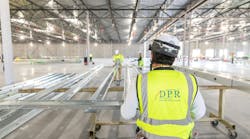Why Data Center Asking Rents Are Surging (Even More Than Expected)
The sudden sharp rise in data center asking rents as newly recorded by CBRE (more on that shortly) would come as no complete surprise to readers of rival commercial real estate services and investment company JLL's recently issued North America Data Center Report | H2 2023.
If the past be any prologue (and it is), JLL determined at the close of last year that due to strong demand from H1 2023 to H2 2023, rates nationally rose 5% for small requirements under 250 kW, and 11% for large requirements of 5 MW+.
The study discerned how rental rates in primary data center markets have risen fastest for small, near-term requirements, as space became more constrained.
JLL's analysis further noted that prices rose highest in markets with rapidly diminishing availability. For instance, Phoenix saw rates rise 17% to 30% (depending on capacity tranche). Meanwhile in Northern California, rates rose 21% to 23%.
The JLL study noted that rapid inflation also pushed annual data center rent escalations to increase to 4% to 5% (or was tied to CPI in some cases). But given that inflation is slowing, at the end of last year, the firm cautiously determined that escalations have returned to "a more typical 3%."
The report was careful to note that near-term pricing last year had increased more dramatically, given a scarcity of readily available space, especially for capacity over 1 MW.
JLL added that rates were lower for precommitments of future product coming online in 2025 or 2026, and that the rental rate discount for larger users of data centers is significant. (On average, the study found rates were 18% lower for requirements above 5 MW than for requirements under 250 kW.)
Overall, at the end of last year, JLL was confident enough to predict that "the rate of rent growth will likely ease in some markets by the end of 2024 or early 2025 as new capacity is added and supply chain bottlenecks continue to abate."
That forecast came with one caveat, however, which was to note that "with power constraints and increasing demand, landlords have power to raise rates, and in tight markets, rent could rise an additional 10% over the next year." (Remember that figure.)
CBRE Finds Data Center Asking Rents Have Surged More Than 50% Over Past 8 Months
Fast-forward to now, when CBRE, hot on the heels of its latest analysis of North America Data Center Market Trends, last week released a market brief stating that average asking rental rates in key North American data center markets have increased by 20% to 54% over the last eight months.
Hewing closely to JLL's similar, earlier analysis, CBRE said the most robust rent growth is occurring in low-availability markets such as Chicago, Dallas-Ft. Worth, Northern Virginia, Phoenix and Silicon Valley.
CBRE contends that the data center asking rent growth in these markets is being "driven by strong demand that is exceeding supply increases and has pushed rates close to their peak highs of the 2010-2011 period."
Power Constraints Slow Supply Expansion
Even as data centers are now sublimely integral to the digital economy, particularly given the rapid growth of AI and data storage and processing, CBRE allowed that in its early market dynamics assessment, new capital sources and investment were originally projected to push down rental rates.
However, the commercial real estate services and investment firm now admits that power constraints are delaying new data center construction "and are the biggest impediment to expanded data center supply," directly quoting from the brief.
CBRE adds that this market dynamic has caused leasing competition for existing data centers to intensify, and rents to remain elevated.
The brief points out that data center occupiers now typically pre-lease space 18 to 36 months in advance, "markedly earlier than the six-to-12 months that was previously the norm."
Construction Boom Can't Touch Vacancy Rates
Meanwhile, in terms of corresponding vacancy and construction statistics, CBRE confirmed that an all-time high of 3,077.8 MW is under construction in primary data center markets, up 46% since H1 2023.
But according to CBRE, despite the boom in construction, vacancy rates have fallen since 2021. The firm added that in H2 2023, vacancy hit record lows in markets including New York Tri-State, Seattle, Central Washington and Chicago.
A Continuing Cycle?
In the near term, CBRE data found that average asking rental rates increased by 20% to 54% over the past eight months in markets such as Silicon Valley (up 54%), Northern Virginia (47.5%), Chicago (47%), Dallas-Fort Worth (29%), and Phoenix (20%).
Lisa DeNight, National Industrial Research Managing Director at Newmark, told commercial real estate industry chronicler GlobeSt.com that, considering the rise of data center requirements leaching over into secondary and tertiary markets, it is likely that there will be a continuing cycle of rent growth in these markets as well.
“Negotiating power is squarely in landlord favor due to ultra-low availability across the board,” said DeNight.
She adeded, “Tenants can and will pay. Top global hyperscalers – major absorbers of data center space – represent some of the largest market caps in the world, and are demonstrating a forecasted average of 25% increase in capital expenditure budgets this year.”
Reckoning with the jump in asking rent across all data center markets over such a short timeframe, CBRE proposed the following questions as possible keys to achieving better balance between supply and demand:
- How can supply growth be accelerated to meet demand? What role will high-growth emerging markets play in this?
- Will alternative/off-the-grid power solutions enable developers to accelerate construction timelines?
- How can occupiers improve their planning processes to secure data center space on a timelier basis?
- Will new transmission and distribution help unlock power supply in constrained markets?
- If so, how much capital and time is required to improve the energy grid for long-term data center development?
About the Author
Matt Vincent
A B2B technology journalist and editor with more than two decades of experience, Matt Vincent is Editor in Chief of Data Center Frontier.



